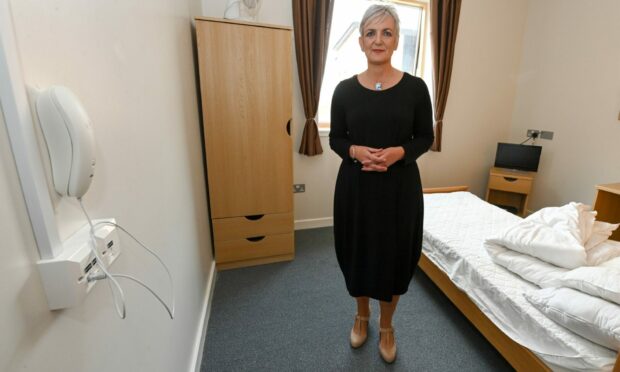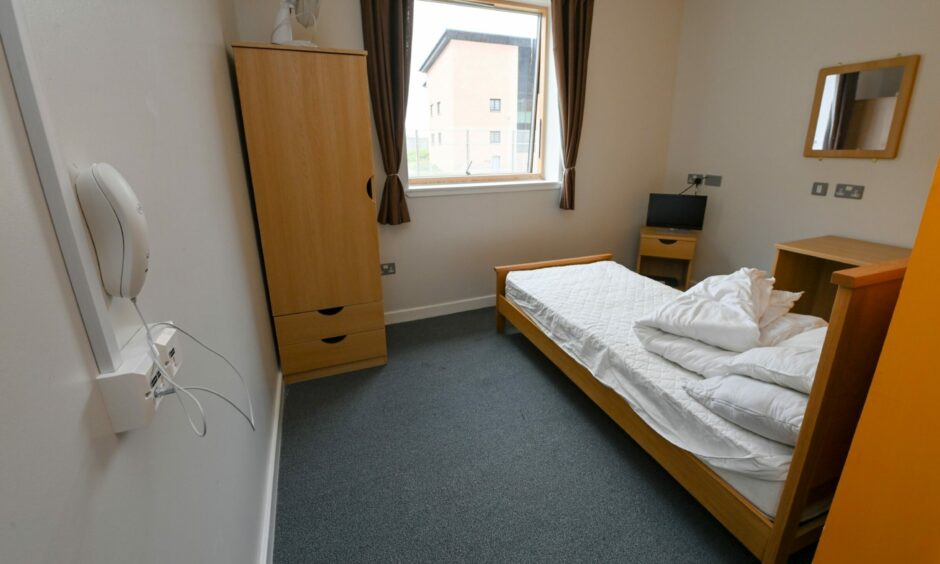The Scottish Prison Service is introducing new in-cell landline phones across all its prisons – including HMP Grampian in Peterhead.
These will replace prison-issued mobile phones, which were introduced in July 2020, as a temporary measure during the Covid pandemic when in person visits were restricted.
The installation of the hard-wired phones was completed at HMP Grampian this week and the temporary mobiles will all be removed from the prison this Saturday.
Justice Secretary Angela Constance visited the facility on Wednesday where she hailed the positive impact the move would have on inmates and reoffending.
It has cost £8.5 million to set up the new phones across Scotland’s prison estate.
It comes as new figures obtained by the Scottish Conservatives show more than 370 mobile phones have been confiscated from prisoners at the Peterhead jail.
These can be removed from prisoners for a variety of reasons including if they have been tampered with or damaged, found with an illicit SIM card, given to another prisoner or if there is alleged criminality.
Earlier this year, more than a dozen current or former inmates at HMP Grampian were handed a fine or more time in jail after being caught with unauthorised sim cards behind bars.
A total of 373 mobile phones were seized from the Peterhead prison between January last year and June 20 this year.
‘IT revolution’
Mike Hebden, governor of the prison, told the Press and Journal the new in-cell phone system is a “natural development” from the devices used during the pandemic.
He said this forms part of an “IT revolution” for the prison as the cabling used will help support ambitions for more in-cell technology to be rolled out.
It will also help support the mental health of inmates, as they will be able to speak to family and friends once locked in their cell at night.
Before the Covid pandemic, prisoners had to queue to access phones in the hall.
A total of 23,000 calls were logged to suicide prevention charity Samaritans across Scotland’s prisons since the temporary mobile phones were issued.
Mr Hebden said that trying to prevent the abuse of mobile phones was “not the rationale” for the new in-cell phones.
But he acknowledged it will make it a “lot easier to control” the issue.
He said: “The issue with a mobile phone is it’s a small item. It’s component parts. They can take it apart and try and do so.
“New system plugs straight into a switchboard. It can’t be changed.”
‘Reduce reoffending’
Ms Constance said there are “huge” personal benefits of the new telephone system and claimed it will help inmates on their rehabilitation.
She said: “The things we know reduce reoffending are maintaining family contact where that is appropriate. Improving people’s mental health and wellbeing and obviously supporting their own learning and development.
“These are potentially disrupted by imprisonment but are the things that matter in terms of the future.”
How will new phones work?
The Scottish Prison Service say the hard-wired in-cell telephones will be subject to the same robust security, which has governed the use of mobile phones and those in halls.
That means people will only be able to call numbers from a pre-approved list, and the Scottish Prison Service will maintain the ability to monitor and record calls.
People in custody will receive 200 free minutes, which is fewer than the 300 provided on the prison-issued mobiles.
This is because not all available minutes have been used and there is a balance to strike between supporting family contact and securing value for money.
In future, the cabling used for the in-cell telephones will support the Scottish Prison Services’s ambitions for in-cell technology.
This will allow futher support contact, increase educational opportunities, and allow inmates to book courses and select meal choices.
It will also free up staff time from transactional tasks, allowing them more time to carry out quality work with those in our care.





Conversation